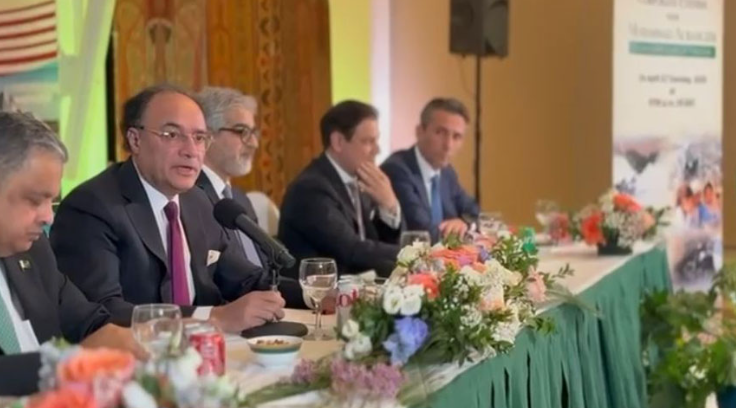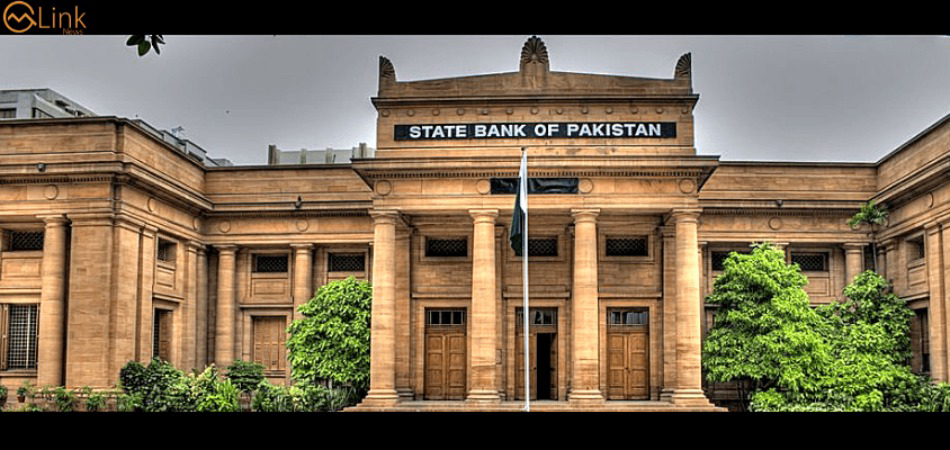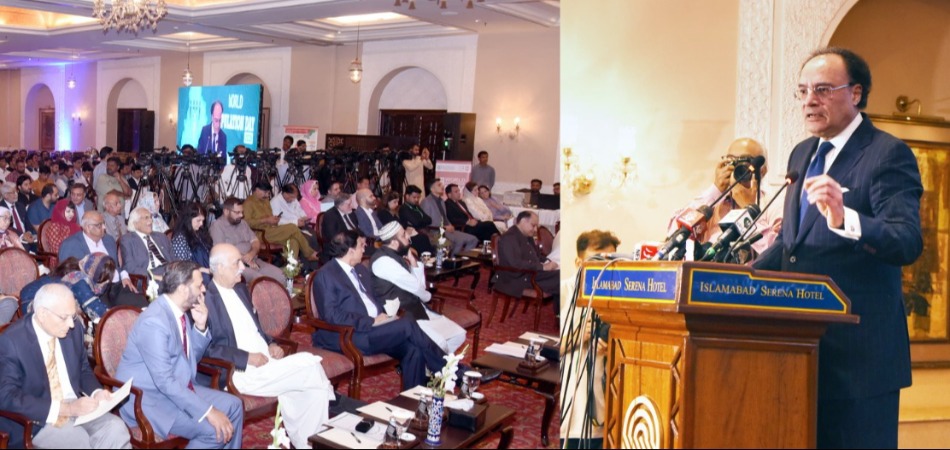Private sector vital for Pakistan’s economic future: FinMin

MG News | April 23, 2025 at 01:20 PM GMT+05:00
April 23, 2025 (MLN): The pivotal role of the private sector in driving Pakistan’s economic future has been emphasized, with the government’s responsibility defined as providing policy frameworks and ensuring continuity, according to Finance Minister Muhammed Aurangzeb.
He was addressing a landmark economic dialogue hosted by the Embassy of Pakistan in Washington DC on the sidelines of the IMF and World Bank Spring Meetings, which brought together Pakistan’s economic leadership, global financial institutions, and corporate representatives from the United States.
The event highlighted Pakistan’s economic turnaround and its growing potential as a global investment destination, as per the press release.
In his keynote address, the Finance Minister described the evolving role of the private sector as a “mindset and societal change,” comparing it to the transformative impact of artificial intelligence.
Engaging in a candid dialogue, he addressed questions regarding the ease of doing business and reaffirmed the government’s commitment to reforms.
He identified population growth and climate change as major existential challenges and called for private-sector collaboration on investable projects using available financial and technical resources.
He reiterated the Prime Minister’s vision of running Pakistan as “Pakistan Inc.,” with the government acting as public servants to facilitate investors.
Ambassador Rizwan Saeed Sheikh, in his welcome remarks, underscored Pakistan’s geostrategic and geo-economic importance as a market of 250 million people and a gateway to Central Asia, China, the GCC, and Afro-Asian regions.
He noted the country’s performance recognized at the IMF-World Bank forums and highlighted its strengths in the IT sector and mineral resources.
He announced plans for recurring events to strengthen U.S.-Pakistan business ties, stating, “As Pakistan’s Chief Marketing Officer, I invite you to profit from the promise of Pakistan.”
Several industry leaders also shared their perspectives during the event. Amir Ibrahim, CEO of Jazz, praised the country’s economic stabilization over the past 15 months and detailed Jazz’s evolution into a digital services platform reaching over 100m users.
He stressed the need for inclusive digital infrastructure and regulatory collaboration to democratize technology access.
Christos Harpantidis, Vice President External Affairs at Philip Morris, acknowledged the company’s $800m investment in Pakistan and outlined further expansion plans, citing the country’s economic stability, controlled inflation, and exchange rate predictability.
Husnain Aslam, CEO of TRG, spoke about his company’s global footprint with 35,000 employees, including 9,000 in Pakistan.
He supported the Prime Minister’s goal of scaling IT exports from $3bn to $25–30bn, pointing to Pakistan’s robust telecom infrastructure and young, skilled workforce.
World Bank Vice President for South Asia Martin Raiser commended Pakistan’s economic recovery, attributing it to fiscal, energy, and exchange rate reforms.
He stressed the need for increased investment and growth, reaffirming the World Bank’s support through its 10-year, $40bn Country Partnership Framework.
Bahadur Bijani, Executive Director at the IMF, praised Pakistan’s policy consistency and economic leadership, noting record-low inflation and currency stabilization.
He emphasized the need to safeguard these achievements and credited the leadership of Finance Minister Aurangzeb, Governor Jameel Ahmad, and Prime Minister Shehbaz Sharif.
Charles Freeman, Senior Vice President for Asia at the U.S. Chamber of Commerce, announced an upcoming visit by a U.S. Chamber and U.S.-Pakistan Business Council delegation to Pakistan the first in seven years.
He acknowledged Pakistan’s renewed stability, transparency, and predictability.
The Finance Minister later engaged with corporate leaders, addressing their questions about Pakistan’s investment potential.
Copyright Mettis Link News
Related News
| Name | Price/Vol | %Chg/NChg |
|---|---|---|
| KSE100 | 134,299.77 290.06M |
0.39% 517.42 |
| ALLSHR | 84,018.16 764.12M |
0.48% 402.35 |
| KSE30 | 40,814.29 132.59M |
0.33% 132.52 |
| KMI30 | 192,589.16 116.24M |
0.49% 948.28 |
| KMIALLSHR | 56,072.25 387.69M |
0.32% 180.74 |
| BKTi | 36,971.75 19.46M |
-0.05% -16.94 |
| OGTi | 28,240.28 6.19M |
0.21% 58.78 |
| Symbol | Bid/Ask | High/Low |
|---|
| Name | Last | High/Low | Chg/%Chg |
|---|---|---|---|
| BITCOIN FUTURES | 118,140.00 | 119,450.00 115,635.00 |
4270.00 3.75% |
| BRENT CRUDE | 70.63 | 70.71 68.55 |
1.99 2.90% |
| RICHARDS BAY COAL MONTHLY | 97.50 | 0.00 0.00 |
1.10 1.14% |
| ROTTERDAM COAL MONTHLY | 108.75 | 108.75 108.75 |
0.40 0.37% |
| USD RBD PALM OLEIN | 998.50 | 998.50 998.50 |
0.00 0.00% |
| CRUDE OIL - WTI | 68.75 | 68.77 66.50 |
2.18 3.27% |
| SUGAR #11 WORLD | 16.56 | 16.60 16.20 |
0.30 1.85% |
Chart of the Day
Latest News
Top 5 things to watch in this week
Pakistan Stock Movers
| Name | Last | Chg/%Chg |
|---|
| Name | Last | Chg/%Chg |
|---|




 MTB Auction
MTB Auction